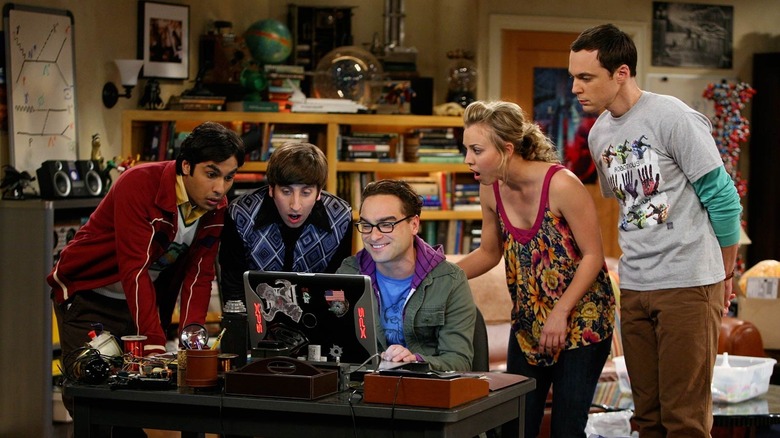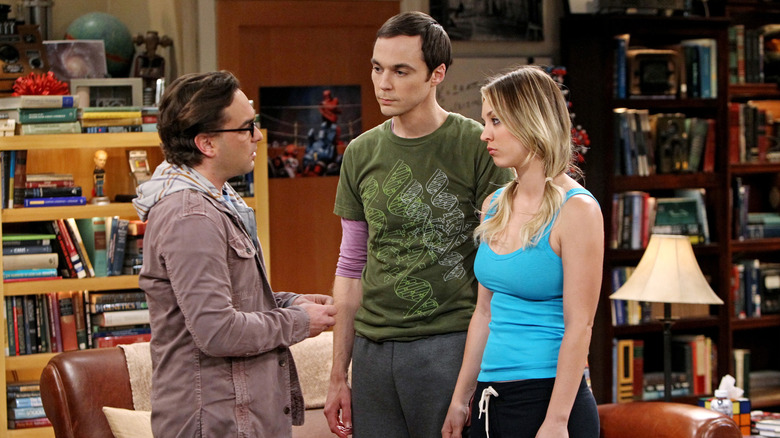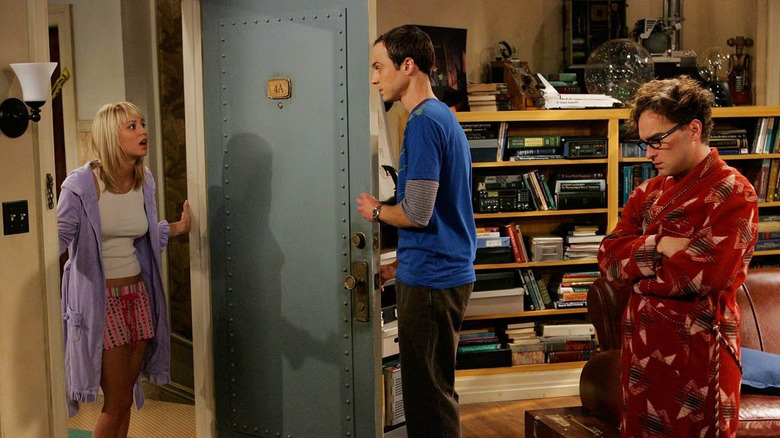The Real-Life Origins Of The Big Bang Theory, According To Co-Creator Bill Prady
We may receive a commission on purchases made from links.
For twelve years and the same number of seasons, Chuck Lorre and Bill Prady's CBS sitcom "The Big Bang Theory" absolutely dominated pop culture, letting "nerds" take over the cultural zeitgeist (in concurrence with the Marvel Cinematic Universe, which arguably did its own work to make "nerdy" things "cool"). According to Prady, who spoke to Variety shortly after the series ended its massively popular run in 2019, he based the story on his own experience, as many writers are wont to do.
"'Big Bang' began as the story of me in my early 20s, when I was in the computer business in New York and failing at romantic relationships," Prady said at the time. "It's the story of that time in my life and I knew I'd get one shot to tell those stories. I don't think I get to come back and re-explore that time again. For me, [the finale] winds up the chance I had to talk about what that time was like."
Furthermore, as Prady said later in the conversation, he feels particularly connected to the show's protagonist Sheldon Cooper, played by Jim Parsons (who won multiple Emmys for the role). In the pilot, Sheldon, who hates change, is confronted with a new neighbor — Kaley Cuoco's outgoing, bubbly Penny — and as Sheldon's best friend and roommate Leonard Hofstadter (Johnny Galecki) develops an enormous crush on Penny, Sheldon is intimidated. As Prady revealed, he understands that feeling all too well.
"Sheldon connects to that part of me that was afraid of the world and liked to retreat into 'Star Trek' and comic books and not the world that has Pennys in it," Prady mused. "For me, that was always the sweet spot of exploring that struggle of whether or not you belong in the world. Remember, the big question in the pilot is whether or not Sheldon and Leonard can make a new friend when Penny moves in next door." Not only that, but Prady revealed in Jessica Radloff's 2022 book "The Big Bang Theory: The Definitive, Inside Story of the Epic Hit Series" that he based some of the lead characters on real people who also suffered from social anxiety ... yet were academically brilliant.
Bill Prady says a real-life guy inspired the main characters on The Big Bang Theory
In the book, both Chuck Lorre and Bill Prady weighed in on the origins of "The Big Bang Theory," and as Lorre recalled, the original idea for a TV show had nothing to do with "nerds," but would have focused on a woman new to Los Angeles trying to navigate the big city. "We were circling around this idea about a young woman who moved to Los Angeles trying to find her way in the world. We actually met with some actresses to play this lead role, but we never really could put that into a coherent form that we were happy with," Lorre said.
Then, as Lorre tells it, Prady helped the two find some inspiration by simply talking about some of his former coworkers. "But one weekend, Bill was telling me about his computer programming days back in the '80s, and these wonderful characters that he worked with who were beyond brilliant, but completely inept in the real world," Lorre continued. "They could figure out Pi to eighty decimals but couldn't figure out a tip in a restaurant because there were too many variables. And I recall saying, 'Well, that's the show! That's the show we should be doing! That's fantastic! These are great characters.'"
"That specific conversation happened in [Lorre's] office in Burbank, where we started talking about the guys I worked with at our software company," Prady remembered. "The specific calculations one guy could do in his head were remarkable. He was a mathematical savant. He also had selective mutism around women. We broke those two qualities off [between Sheldon and Raj], because although it was based on an actual person, it would have seemed unbelievable on a show at the time, even though this person really did suffer in that way." (Prady and Lorre did, in fact, split up these traits, giving Kunal Nayyar's Raj Koothrappali the selective mutism, which Nayyar admits he wasn't wild about.) Prady went on, "Now we look at these things and have a better understanding of people who are neuro-atypical and who process the world differently, but at the time, he was just that dude! And he did that stuff!"
The original idea behind the show that became The Big Bang Theory ended up coming full circle
Still, Chuck Lorre had one major hesitation about "The Big Bang Theory," which is that he didn't want to lean too heavily into stereotype. "But I didn't want to do the computer 'nerd,' the guy with the pocket protectors and the pens and the glasses with the tape in the middle," Lorre said. Plus, as Bill Prady said, Lorre pointed out that filming a bunch of guys hanging out and using their computers simply wouldn't be cinematic. "Chuck also said it's hard to show people at computers in a multicam because they're hunched over a computer," Prady recalled. "I just remember thinking out loud, 'What's smart that you do standing up?' And then as I was writing, I said, 'Oh, i'm writing on a whiteboard,' which quickly became, 'Oh, scientists!' It was more shootable [to show a whiteboard versus a computer screen."
"I recall suggesting that these characters were not interested in getting rich, but unraveling the secrets of the universe," Lorre mused. "I didn't even know what that meant. 'A Beautiful Mind' with Russell Crowe had already been out, which was a little darker than we wanted to go. We decided to go for brilliant minds without the psychosis." Amidst all of this, Lorre said that the original idea about a girl moving to a new city and making friends came back into play, though as fans of "The Big Bang Theory" know, the city changed from Los Angeles to Pasadena (mostly because many of the main characters, including Sheldon and Leonard, work at Pasadena's California Institute of Technology). "
And then our abandoned idea that the young woman who comes to Los Angeles to find her way in the world suddenly made sense because if we could put her in the world of these physicists, she would be the audience," Lorre clarified. "She would be us. They'd have to explain to her, thus explaining to us — the audience — what the hell is going on. And so the two elements kind of came together very quickly." The rest, obviously, is history.
All of "The Big Bang Theory" is streaming on Max now.


